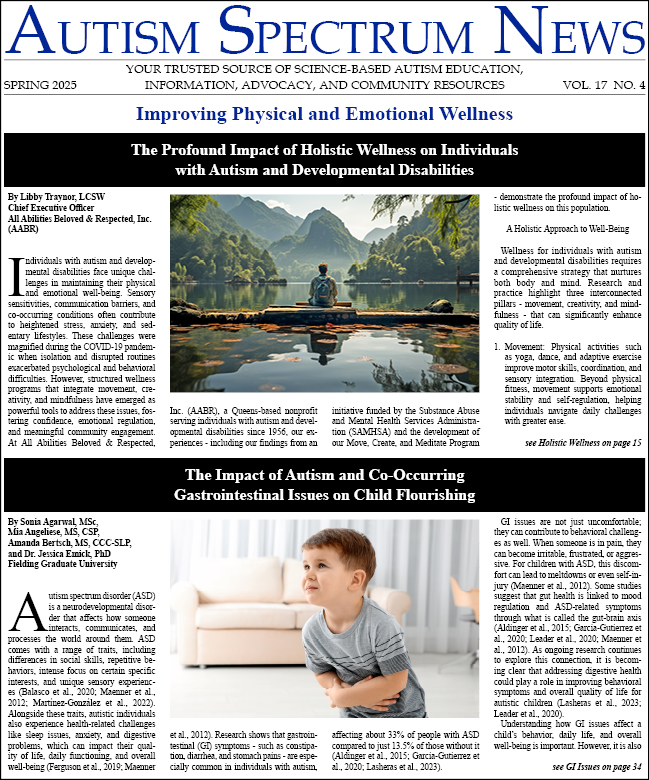Since I was very young, I had a fascination with people who had Autism. Although in some ways they seemed different than me, in others there were a lot of similarities. Later as an adult, it was suggested that I might have a lot in common with people who have Asperger’s Syndrome. So, one Wednesday evening back in 2009, I attended a support group for “Aspies;” a term many people with Asperger’s Syndrome call themselves. I also learned that people who do not have Asperger’s or Autism are sometimes referred to as “NT’s” (Neurotypicals). Unfortunately, at the time my work hours (in the autism field, of course) didn’t allow me to attend more of these meetings. Luckily, a year later my schedule changed and I was finally able to attend these Aspie groups on a more regular basis.

At these meetings, I met Jon Anderson, who would become one of my best friends. He, along with Dr. Irmi (now another best friend), had started a separate program called the Autistics Career Development Group. This program allowed people on the spectrum the opportunity to get together twice a month to go over their resumes and discuss job interview techniques and strategies on how to find a job and on how to keep a job once they were hired for it.
After about a year, I was asked to co-coordinate the Autistics Career Development Group. At the time, I was in the middle of a career change myself, and the timing couldn’t have been more perfect. Soon after that, we realized that our members were much more interested in socializing than in talking about resumes and getting a job. In response to this, we changed the focus of our groups to address social issues, working on skills that lead to success in all areas of life and changed our name to Aspies for Success. More recently, we changed the name again to Aspies for Social Success.
Without the opportunity to socialize, there are fewer opportunities to take in culture. So, in 2013, we added cultural events to our schedule, including trips to The Metropolitan Museum of Art (with a private tour and a specialized art project for our group) and the Museum of Modern Art, plus visits to restaurants, trying different cultural cuisines.
We continue to expand with more social groups. Now, in 2014, we have a new support group based on the 70’s style Rap Sessions with smaller group sizes (no more than 20 members). It is somewhat less structured, with each session starting with a theme rather than a specific topic.
Not forgetting the roots of our organization, I have been reaching out to employers and talking about the advantages of hiring someone with Asperger’s Syndrome.
Advantages of Hiring Someone with Asperger’s Syndrome
Individuals with Asperger’s Syndrome (AS) often have average to above average intelligence. They tend to possess excellent abstract thinking abilities and rote memory skills. One characteristic unique to AS is an intense interest in one or two subjects, to the exclusion of all others. Many times, individuals with AS are respected for their unusual abilities, and due to their extensive knowledge of certain topics or activities may be regarded as “eccentric.” The individual’s single-minded pursuit of his or her interest can lead to great achievements later on in academic and professional life.
Some specific areas in which individuals with AS tend to excel include, but are not limited to:
- Mathematics
- Computer science, from technical support to Machine Learning and everything in between
- Physical sciences, for example engineering of all types and architecture
- Special aptitudes with visual spatial skills as well as great attention to detail make for incredible artists
I am writing this article on the heels of a huge success at one such employer. Quirky is a company that turns invention ideas into real consumer products. We had 15 members show up for a tour of Quirky’s facilities (very impressive), a presentation of what the company does, what types of jobs they offer and who they hire. They have agreed to specifically hire people on the Autism Spectrum with accommodations, especially when it comes to the specific social skills it takes to interview for a job there, and to keep it. I am also working with two other potential employers, Specialisterne and Ultra Testing, that specialize in only hiring individuals on the spectrum. I hope to find the same success again.
One of our biggest goals is to create a more inclusive community; one that accepts not only individuals diagnosed with Asperger’s or another Autism Spectrum Disorder, but also accepts those individuals without a diagnosis who, for any reason, have difficulty with social communication, sensory processing or executive function (e.g. Non-Verbal Learning Disability and Social Anxiety). I think that it is also extremely important to recognize that these issues do not occur in a vacuum, and that we must accept that individuals in our inclusive community may have co-morbid conditions. Vive la difference!
Reaching Beyond Neurodiversity
Inspired by Dr. Irmi, we are planning a special event where we will be inviting people of all cultures and races to discuss the issues of living in a neurodiverse world, and on how to transcend all borders and barriers in building a more inclusive community.
Looking to the future, we are working towards non-profit status so that we can participate in fundraising and offer our inclusive community even more. Perhaps someday we will have a brick and mortar community center where people on the autism spectrum can go for support and for engagement in social and cultural groups and events.
As an organization and a community, we will continue to be a work in progress.
Stephen Katz facilitates a variety of support, social and cultural groups for adults with Asperger’s Syndrome, including those who are on the autism spectrum or have difficulty with social communication. In the past, this included the GRASP Manhattan support in New York City. He has also worked on a variety of projects for GRASP including, “Persons on the Autism Spectrum in Their Communities of Faith,” a ground-breaking seminar moderated by GRASP founder Michael John Carley.
Additionally, Stephen’s background includes training with the Miracle Project, the musical theatre arts program for special needs kids, as seen in the HBO Documentary, “Autism the Musical.” He has co-led socialization groups for 16-21-year-olds with a variety of special needs, including those on the high functioning end of the autism spectrum and those with varied communication and learning differences at The Manhattan JCC. Stephen was also employed by YAI/NIPD, where he worked with individuals of all ages and abilities in their homes, creating and implementing teaching strategies that increased language and improved academic, vocational and life skills, helping them lead more independent and productive lives.
Previously, Stephen has worked in advertising, marketing and finance. He is also an artist and has studied at the prestigious Art Students League and Parsons School of Design. His education also includes a Certificate in Human Resource management from New York University and a certificate in Learning Theory and Applied Behavior Analysis from The New York League of Early Learning (NYL) with additional classroom and hands on training and experience in Verbal Behavior, DIR/Floortime and Son Rise. For more information, please contact Stephen at Steveck42@aol.com.





